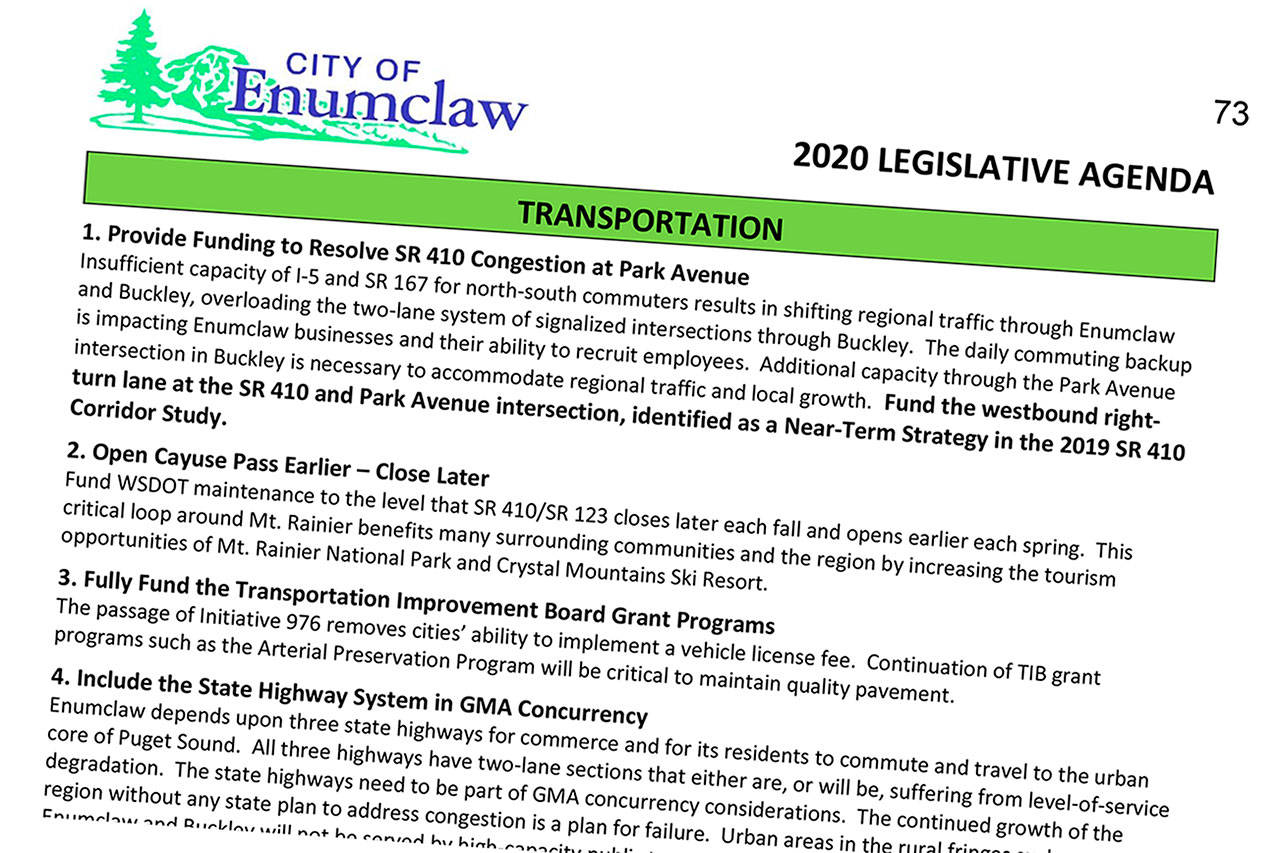Enumclaw’s city leaders annually draft a “wish list” of sorts, a concise rundown of items they would like to see addressed in Olympia.
This year’s list – formally adopted as the City Council’s Legislative Agenda – was approved in January and sent to 31st District lawmakers (Sen. Phil Fortunate and Reps. Morgan Irwin and Drew Stokesbary).
The single-sheet list has just some minor changes from the document adopted a year ago. It is divided into three categories: transportation; parks trails and open space; and mental health.
Heading the council’s list is a desire to see Olympia provide funding to resolve congestion at Park Avenue in Buckley.
“Insufficient capacity of I-5 and SR 167 for north-south commuters results in shifting regional traffic through Enumclaw and Buckley, overloading the two-lane system of signalized intersections through Buckley,” the council wrote. “The daily commuting backup is impacting Enumclaw businesses and their ability to recruit employees.”
Enumclaw’s requested solution would be the creation of a right-turn lane at the intersection of SR 410 and Park Avenue. That same suggestion was identified as a “near-term strategy” in a 410 corridor study commissioned by the state’s Department of Transportation.
Keeping with the highway theme, Enumclaw made a pitch for greater upkeep of routes 164 and 169, as well as SR 410.
“Enumclaw depends upon three state highways for commerce and for its residents to commute and travel to the urban core of Puget Sound,” according to the Legislative Agenda. Having said that, the city took issue with current approach.
“The continued growth of the region without any state plan to address congestion is a plan for failure,” the city wrote.
The council-approved document also noted how cities “in the rural fringes” – like Enumclaw and Buckley – “will not be served by high-capacity public transit and must rely on these state highways for mobility.”
Another recurring transportation request was initially identified as a longer “open season” on Cayuse Pass. The pass closes in the fall and is opened in the spring, eliminating tourism opportunities for communities surrounding the mountain, the city stated.
Council members disagreed with the “close later and open earlier” concept that was originally in the Legislative Agenda. By consensus, the wording was changed, reflecting a desire to see the pass open even during winter months.
Councilman Anthony Wright noted that Congresswoman Kim Schrier has suggested having the pass open year-round on a trial basis, perhaps for three years. Data would have to be collected to determine if such a move makes sense from a financial standpoint.
Under the “parks, trails and open space” heading, the only entry was a familiar one: full funding for the much-anticipated crossing over the White River that would connect King and Pierce sections of the Foothills Trail.
While the proposed bridge would be intended for trail users, the city emphasized that it could provide service for emergency vehicles if the existing 410 bridge had to be closed.
Finally, under the “mental health” heading, the city appealed for a statewide effort to help those suffering from addiction and/or behavioral issues. The current crisis “has placed a strain on hospitals, law enforcement and human service agencies,” the Legislative Agenda noted, adding that the issue is too large to be handled at the local level.


